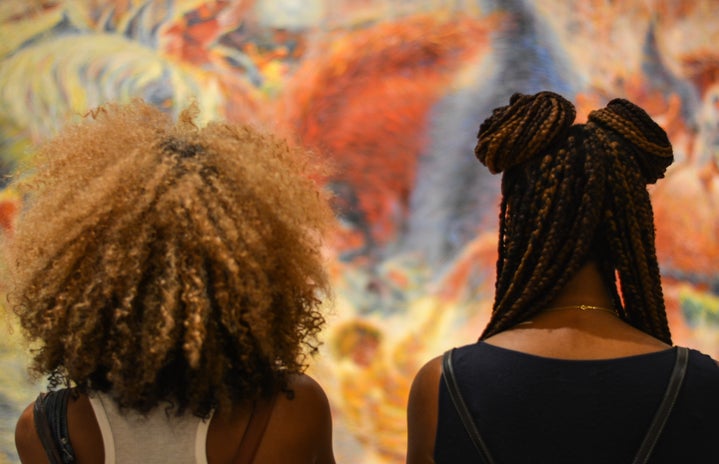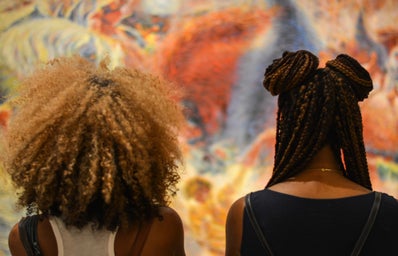In the midst of Black History Month, it’s important to reflect as a non-Black person in America (or any person for that matter). With all of the disparities coming to light this past year and the Black Lives Matter movement getting the media coverage that it deserves, it’s important that we’re still talking about ways we can educate ourselves, amplify Black voices, consume more Black media, and reflect/understand the role that anti-Blackness plays in our lives. Black lives still matter, even if there’s less protests on your news network, or less posts about it on social media. It’s not a trend, it’s a movement.
A quote I’ve resonated with that represents this article, and hopefully you resonate with as well is, “How can we love Black people by seeing them, hearing them, relishing in them, and creating a world where Black people feel loved, inspired and protected?” That question represents this entire month as an ally, and it’s so important we amplify Black voices instead of speaking over them. This year has been bringing social injustice to the forefront of media, but there have always been these struggles and inequalities within Black communities. Although you can do a lot of different things to amplify Black voices, I’ve tried to list a few ways you can educate, consume media, and be diligent and reflective on the communities you are a part of.
1. Listen to Podcasts Hosted By Black Women
Specifically supporting Black women is important not only for racial representation, but for female representation as well. The podcast world is an interesting one to note because it’s dominated by white male creators. According to Quartz, 85% of podcasts in America had at least one white host, and 66% of them had a white male host. An amazing podcast hosted by Black women is H.E.R Space which focuses on healing, empowerment, and resilience and offers a safe space for Black women to just be. Another excellent podcast is The Sexually Liberated Women which promotes feminism, representation, and empowerment for all women. There are so many podcasts hosted by Black creators, but I don’t want to overwhelm you with too many, so I suggest starting with these and doing more research after.
2. Documentaries and Books That Can Help Educate You
Although mainstream media and representation is extremely important, you also need to understand the history to help ignite change. Here is a list of some documentaries that may help educate you, PBS is airing quite a few this month. Here is a list of some books you can read that will also help educate you. Here’s another resource that can help you support Black authors, as it lists 44 books that were all written by Black Authors.
3. Seminars You Can Attend (Hosted by UC Davis!)
There are so many different seminars and workshops that are hosted to educate the general public about racial issues and social justice in varying topics. I decided to look at those that are hosted by UC Davis because they are geared towards UC Davis students. The first event is on February 24th, hosted by Clinical Psychologist Tiffany Mimms which focuses on Mental Health in the Black Community. Here is a link for more information! The next seminar is on February 26th hosted by Dr. Shelley Francis focuses on the Intersection of Transportation, E-mobility, and Diverse Communities. Here is a link for more information. The final one I’ll advertise is the Racial Justice Speaker Series hosted by Professor Paul Butler on March 3rd. Here is a link for more information on this. If you’re interested in finding out about more seminars as more information is released, here is a link to the UC Davis seminars all students have access to.
4. Female Black Artists You Can Listen to
My personal all-time favorite media is music. I’ve been more conscious about the music I listen to and the artists that I support. I’ve specifically noticed that I don’t listen to a lot of women, and I’ve been making an effort to. Here are some Black women artists that are undeniably worth listening to. Justine Skye is a super talented artist that combines old school soul with modern R&B. You can stream her here. SZA is an all-time favorite of mine that has a poetic song-writing style, even though some of her songs are huge, it’s worth looking into some of the older works that she’s produced. You can stream her here. Ari Lennox is another amazing artist, she’s talented and has collaborated with some very well-known artists. You can stream her here. Alex Isley is the final artist that I’ve really enjoyed listening to recently, and less well known than the others, but definitely worth a listen. You can stream her here. I encourage you (and myself) to do more research on up and coming Black women artists to add to your playlists.

5. Black-Owned Businesses That You Can Support
Black-owned Businesses need support! It’s also important though that you educate yourself on the history of Black-owned businesses and understand the obstacles that these business owners still face today. Here’s a good resource to learn more about that, but it’s important to take the steps to also support them. A good resource is WeBuyBlack to replace some brands that you already use with Black owned brands. Here’s a comprehensive list of Black-owned restaurants and pop-ups in the surrounding Bay Area that you can support. You can also do your own research for your local city and learn about what you can do to support Black-owned businesses.

6. Reflect on Yourself and Your Communities’ Roles in These Injustices
This is not only time for education and understanding the historical impacts of what’s happened. You need to understand how this impacts what is happening right now. There is still so much social injustice in this country, and it’s important to not ignore that and know your role and your communities’ roles in this injustice. From minor to major scales, you need to reflect on how anti-Blackness exists in your life still, and what you can do to progress and work towards change. Whether it be resources or consuming more Black media, there are so many things you can do to be a better ally and combat the anti-Blackness that exists in our country. Whether it be media, businesses, or something else, I encourage you all to be more conscious about who your actions are truly supporting.





